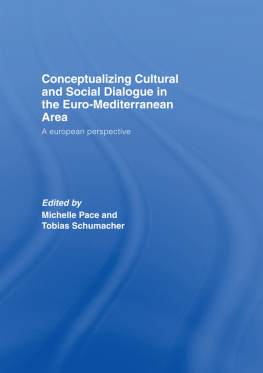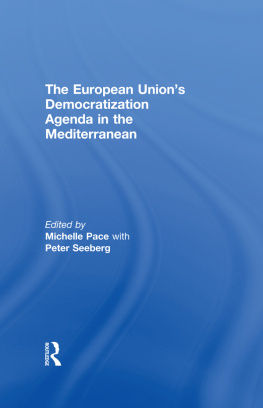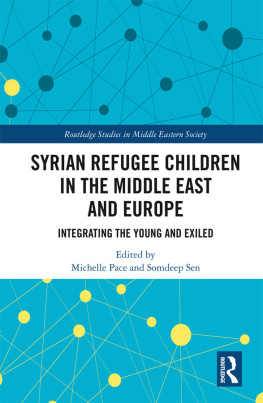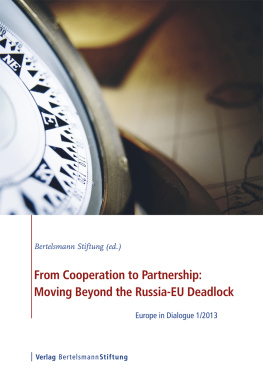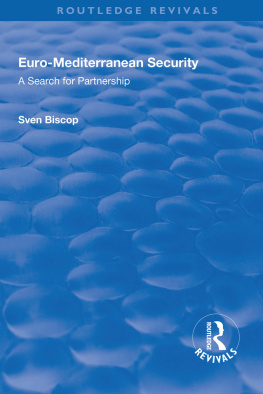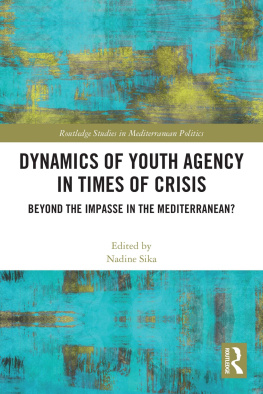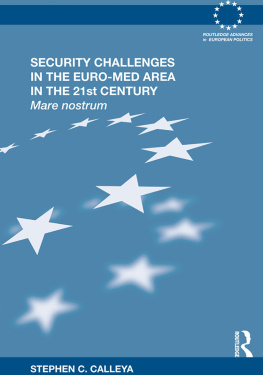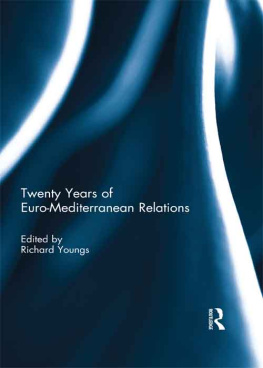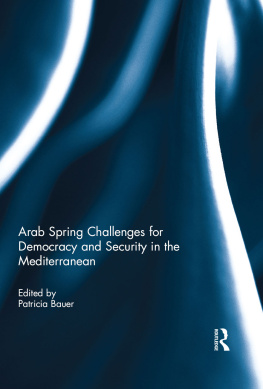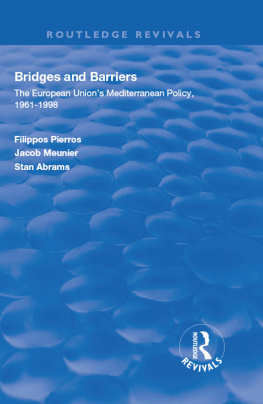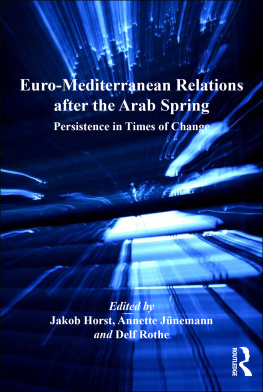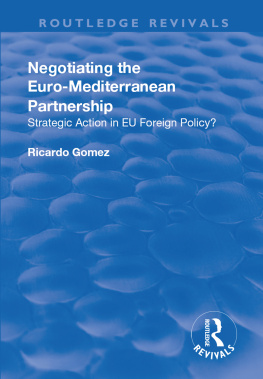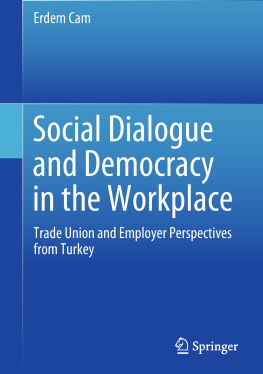Conceptualizing Cultural and Social Dialogue in the Euro-Mediterranean Area
This collection critically analyzes the dynamics and complexities of the wider Euro-Mediterranean area on the basis of individual theory-informed designs and conceptual frameworks.
Since the predominant focus has been on the first (political and security partnership) and the second baskets (economic and financial partnership) of the Barcelona Process, our contributors analyze social and cultural issues (the third basket of the Euro-Mediterranean Partnership), drawing upon linkages between concepts, structures and policy outcomes.
Some articles focus on the impact of the EUs actor capability in the area of EU policies towards the South in enhancing interregional dialogue, understanding and cultural cooperation. Others focus on a critical discourse analysis of dialogue, identity, power, human rights and civil society (including Western and non-Western conceptions). Finally, it culminates with discussions at roundtables organized by the EuroMedCultur network (in the making) on culture and community in the Euro-Mediterranean area. This network brings together civil society activists, policy makers and academics working on social and cultural issues in the area.
This book was previously published as a special issue of Mediterranean Politics.
Michelle Pace is Research Fellow in the Department of Political Science and International Studies, European Research Institute, University of Birmingham, Birmingham, UK
Tobias Schumacher is Research Fellow and Coordinator in the European University Institute, Florence, Italy
Conceptualizing Cultural and Social Dialogue in the Euro-Mediterranean Area
A European Perspective
Edited by Michelle Pace and Tobias Schumacher
First published 2007 by Routledge
2 Park Square, Milton Park, Abingdon, Oxon, OX14 4RN
Simultaneously published in the USA and Canada
by Routledge
270 Madison Ave, New York, NY 10016
Routledge is an imprint of the Taylor & Francis Group, an informa business
2007 Taylor & Francis Ltd
All rights reserved. No part of this book may be reprinted or reproduced or utilised in any form or by any electronic, mechanical, or other means, now known or hereafter invented, including photocopying and recording, or in any information storage or retrieval system, without permission in writing from the publishers.
British Library Cataloguing in Publication Data
A catalogue record for this book is available from the British Library
Library of Congress Cataloging in Publication Data
A catalog record for this book has been requested
ISBN 10: 0415371295
ISBN 13: 9780415371292
Since its inception in November 1995, the Euro-Mediterranean Partnership has created various links between the now-35 member states of the European Union and the countries of the southern littoral of the Mediterranean. Little concern about the existence or the fostering of such links was shown by policymakers until then, although the occasional scholar tried to develop the notion that the countries bordering the Mediterranean constituted, particularly in historical times, an important strategic, political, economic and even a cultural entity. Fernand Braudels seminal 1966 study of the Mediterranean and the Mediterranean World at the time of Philip II of Spain is the chief modern example of this. In classical times, Greek and Roman authors were also greatly interested in what brought the peoples of the Mediterranean littoral together rather than what set them apart.
Today, in a post-9/11 context, a Madrid and London bombings era, we do not hear much about links and commonalities in this area. The tone of the discourse centres on clash of civilizations, threats, terrorism and irreconcilable political, economic and cultural differences. In the space of ten years since the start of the so-called Barcelona Process, an optimistic and far-reaching initiative undertaken by the European Union and its Mediterranean neighbours, efforts to create a common area, a zone of shared prosperity and a social, cultural and human partnership have come to seem quixotic, even pointless, in the current international climate.
The third basket of the Social, Cultural and Human Chapter of the Barcelona Agreement, whose achievements and failures these studies explore, represents a radical change in European thinking. It represents the ambitious idea promoted by European Union policy-makers that encouraging understanding between cultures and exchanges between civil societies is a necessary component of any political, strategic or economic programme aimed at promoting democracy in neighbouring Mediterranean countries. Testimony to the ongoing conviction in the crucial importance of all these components may be found in their incorporation in the more recent 2003 European Neighbourhood Policy.
Since the European Union has repeatedly declared that full membership in its institutions and full participation in its policies is restricted to European countries only, any special relationship or privileged partnership has to be based on much more than mere trade preferences or opening of borders to immigrant workers. The key question is whether the EU can really cast off old, sometimes neo-colonial, attitudes and present-day fears and work toward the stated objective set forth by the European Commission in 2002 of bringing people on both sides of the Mediterranean closer together, to promote their mutual knowledge and understanding and to improve their perception of each other. This collection presents a thorough analysis of how this objective can be implemented in practice and is a recommendable read for academics, civil society representatives, EU policy makers and students of Euro-Mediterranean studies who are keen to explore new theoretical and empirical grounds in this field.
Glenda G. Rosenthal
Institute for the Study of Europe, Columbia University
TOBIAS SCHUMACHER
European University Institute Florence, San Domenico di Fiesole, Italy
When the Foreign Ministers of the European Union (EU) and the then 12 Mediterranean Non-Member countries (MNC) in November 1995 met in Barcelona and solemnly inaugurated the Euro-Mediterranean Partnership (EMP), this event marked a turning-point in the history of Euro-Mediterranean relations.1 For almost 40 years, Europes policies towards its southern periphery were based on financial assistance and economic co-operation and thus characterized by most observers as a pure aid-and-trade approach (Gillespie, ed., 1997; Schumacher, 1998). With the entering-into-force of the Barcelona Process, however, Euro-Mediterranean relations were given a new framework which abolished the decade-old (European) pre-occupation with economic matters. In addition to a revised chapter on economic and financial co-operation, both the Barcelona Declaration and the new Euro-Mediterranean association agreements (EMAA), superseding the co-operation agreements concluded in the mid-1970s, provide for a political and security co-operation and, most of all, establish the so-called third basket which, in turn, allows for social and cultural co-operation and herewith a social and cultural dialogue. Given the popularity of frightening and actually unjustified assumptions that the two main religions along the northern and southern Mediterranean shores, i.e. Christianity and Islam, were in a continuing and deeply conflictual relation (Huntington, 1996) which supposedly precludes Western and Islamic societies from peaceful and collaborative co-existence, Euro-Mediterranean social and cultural co-operation was also conceived with the aim to dispel any putative clash of civilizations. Like the first basket, the creation of the third

